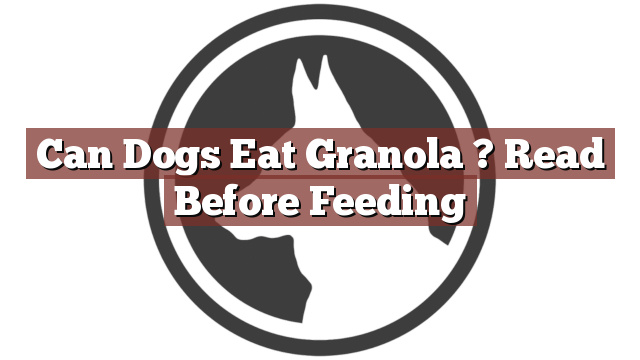Understanding Your Dog’s Dietary Needs
As pet owners, it is essential to understand the dietary needs of our dogs. Providing a balanced and nutritious diet is crucial for their overall health and well-being. While dogs are primarily carnivorous animals, they can also benefit from certain fruits, vegetables, and grains in moderation. However, it is important to be cautious about the foods we offer them, as not all human foods are safe for dogs to consume.
Can Dogs Eat Granola? Read Before Feeding
Can dogs eat granola? This is a question that many dog owners may have. Granola is a popular breakfast cereal that typically contains oats, dried fruits, nuts, and sometimes honey or other sweeteners. While granola can be a healthy and nutritious option for humans, it may not be suitable for our furry friends.
No, dogs should not be fed granola. Although oats and some fruits can be beneficial for dogs, the ingredients commonly found in granola can be harmful to them. Many granola brands contain raisins, which are toxic to dogs and can cause kidney failure. Additionally, the high sugar content and added sweeteners in granola can lead to obesity and dental problems in dogs.
Pros and Cons of Feeding Granola to Dogs
While it is clear that feeding granola to dogs is not recommended, let’s explore the pros and cons in more detail:
Pros:
- Oats: Oats are a good source of fiber for dogs and can aid in digestion.
- Nuts: Some nuts, such as unsalted peanuts, can provide dogs with healthy fats and protein.
- Dried Fruits: Certain dried fruits, like unsweetened cranberries or blueberries, can be a tasty and nutritious treat for dogs.
Cons:
- Raisins: Raisins are highly toxic to dogs and can cause severe kidney damage.
- High Sugar Content: Granola often contains high amounts of sugar, which can lead to obesity and other health issues in dogs.
- Added Sweeteners: Artificial sweeteners, like xylitol, commonly found in granola can be toxic to dogs and should be avoided at all costs.
Conclusion: Is Granola Safe for Dogs?
In conclusion, it is best to avoid feeding granola to dogs. While some ingredients in granola can provide benefits to dogs, such as oats, nuts, and certain dried fruits, the potential risks outweigh the benefits. The presence of raisins, high sugar content, and added sweeteners make granola a potentially harmful food for dogs. It is always a good idea to consult with a veterinarian before introducing any new food into your dog’s diet to ensure their safety and well-being. Remember to prioritize a balanced and species-appropriate diet for your furry companion.
Thank you for taking the time to read through our exploration of [page_title]. As every dog lover knows, our furry friends have unique dietary needs and responses, often varying from one canine to another. This is why it's paramount to approach any changes in their diet with caution and knowledge.
Before introducing any new treats or making alterations to your dog's diet based on our insights, it's crucial to consult with a veterinarian about [page_title]. Their expertise ensures that the choices you make are well-suited to your particular pet's health and well-being.
Even seemingly harmless foods can sometimes lead to allergic reactions or digestive issues, which is why monitoring your dog after introducing any new food item is essential.
The content provided here on [page_title] is crafted with care, thorough research, and a genuine love for dogs. Nevertheless, it serves as a general guideline and should not be considered a substitute for professional veterinary advice.
Always prioritize the expert insights of your veterinarian, and remember that the health and happiness of your furry companion come first.
May your journey with your pet continue to be filled with joy, love, and safe culinary adventures. Happy reading, and even happier snacking for your canine friend!

